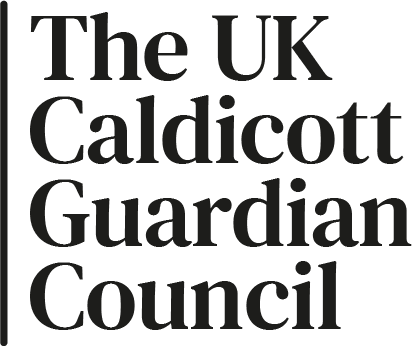Council Meeting
27th February 2019
Present
Dr Chris Bunch (Chairman), Sandra Lomax, Dr Arjun Dhillon, Tim Kendall, Air Commodore Withnail, Christopher Fincken, Gill Bennett, Carey Bloomer, Stephen Hinde, Helen Dyer, Andrew Harvey, David Riley.
Guests
Helen Brown, Wendy Harrison, Megan Inett, Sophie Morris, Matt Lutkin, Natalie Young.
Observers
Ross Thornton
Apologies
Dr Cait Taylor, Dr Matt Noble, Faouzi Alam, Professor Martin Crook, Ben Heal, Nina Monckton, Dale Phillipson, Dr Fenella Wrigley, Dawn Monaghan, Richard Powley.
Conflicts of interest from Sandra Lomax and Christopher Fincken (as training providers) were noted.
Chairman’s update
The Chairman updated council members on his recent meetings including attendance at the National Data Guardian’s Panel, the LHCRE IG steering group and the Confidentiality: code of practice working group.
Vice Chair’s update
The Vice Chair updated council members regarding the ongoing engagement with the Scottish Caldicott Guardian forum and the Missing Persons Considerations guidance that is being developed in collaboration with the Police.
Regional networks
The North network provided an update to council members on the UKCGC event for small organisations that was held in Leeds on 11 January 2019 and was received well by members of the Northern network. The South network has a meeting scheduled for Wednesday 13 March 2019 in the Department of Health and Social Care offices on Victoria Street. Over 15 attendees are already confirmed to attend, and a number of guest presenters have been arranged. The South West network are in the process of planning their next regional network event.
Requests for advice
The Council discussed recent requests for advice that have been received by the UKCGC mailbox or raised on the Digital Health Caldicott Guardian forum. Full details of requests for advice can be provided on request, and some are also available to view as discussion topics on the digital health Caldicott Guardian forum.
Caldicott Guardians and supporting staff may contact the Council for advice by email to the Secretariat, via the Council website support page, or by posting to the Digital Health Networks Caldicott Guardians’ online forum.
Missing persons guidance
Sandra Lomax presented the proposed final version of the missing persons guidance that has been developed in collaboration with the Police. Council members proposed some minor amendments prior to its publication and sharing on the UKCGC and Police websites.
Domestic violence guidance
Christopher Fincken presented an update on the ongoing domestic violence guidance that he is progressing. There were discussions on a proposed statement of endorsement by the UKCGC for information sharing without consent and where GPs sharing information with the police about high risk perpetrators might be justified.
NCRAS guidance - raising awareness of cancer registration
Megan Inett and Sophie Morris Engagement Awareness Managers from the National Disease registration team at Public Health England (PHE) presented to council members regarding improving awareness of cancer registration.
The National Cancer Registration and Analysis service (NCRAS) is embedded within PHE and receives data on all cancer cases across England. Data flows automatically to the registry including demographic information, local feeds and national feeds. Analysis is undertaken to support a wide range of tools and outputs Providing intelligence for trusts, clinicians, commissioners and local authorities in the planning, management and evaluation of cancer services, health research and academia.
Council members were informed that the NCRAS consent model provides permission to receive, store and use the data without explicit patient consent and has a separate opt out process specific to the cancer registry. Council members noted that the number of totals Opt-outs in comparison to the National Data Opt-out suggests awareness of NCRAS opt out is low. Concerns were also raised about the process of contacting patients once they have made a decision and if this respects patients choice to opt-out.
The Council agreed to help raise NCRAS awareness via Caldicott Guardians and the existing UKCGC networks and mechanisms.
Population health tool
Helen Brown and Wendy Harrison from NHS England presented to Council members regarding the Secondary Uses Data Governance Tool (SUDGT). The SUDGT will support data governance for secondary use activities only. It is designed to predominantly support managers, but components of analysis may also be utilised by clinicians and patients.
NHS England were keen to understand the views of the council regarding the scope of direct care in relation to analysis supporting direct care, using anonymised data or patient level pseudonymised data to support the management of the NHS and the application of optouts for secondary use data when used within the health and care system.
Care Quality Commission (CQC) ‘Well Led’ inspections
Matt Lutkin from NHS Digital’s Cyber Security programme and Natalie Young from CQC presented to Council regarding the collaborative CQC and NHS Digital well led inspections. Council members were informed of how the well led inspections will help the CQC understand the reality and Inform future strategy helping to ensure there is a safe environment to deliver patient care. Council members enquired how inspections would apply to sectors beyond acute trusts and there were also discussions around the intention from NHS Digital that to establish a qualified cyber security expert in each trust. Council members discussed the differences between being competent as opposed to qualified.
Other business
The UKCGC received an enquiry asking if there are any standard Caldicott Guardian job description templates. The UKCGC Secretariat has requested council members submit any useful templates to the shared mailbox so they can be distributed as appropriate.
Christopher Fincken also offered council members free tickets to the upcoming Healthcare conferences UK Caldicott Guardian Conference.
